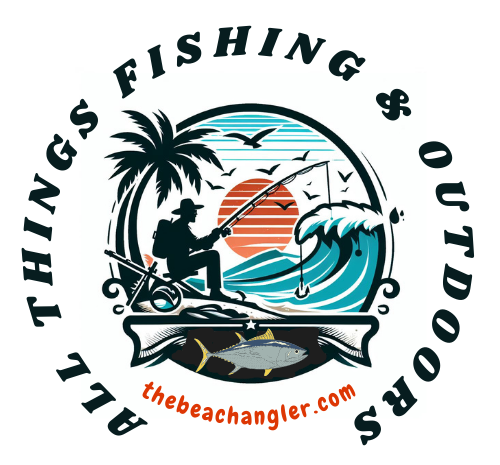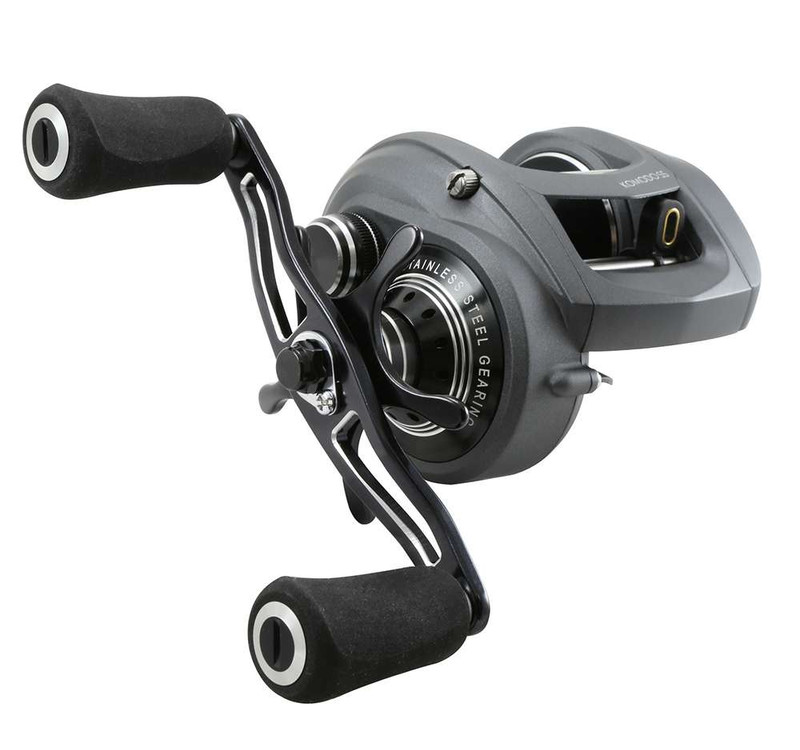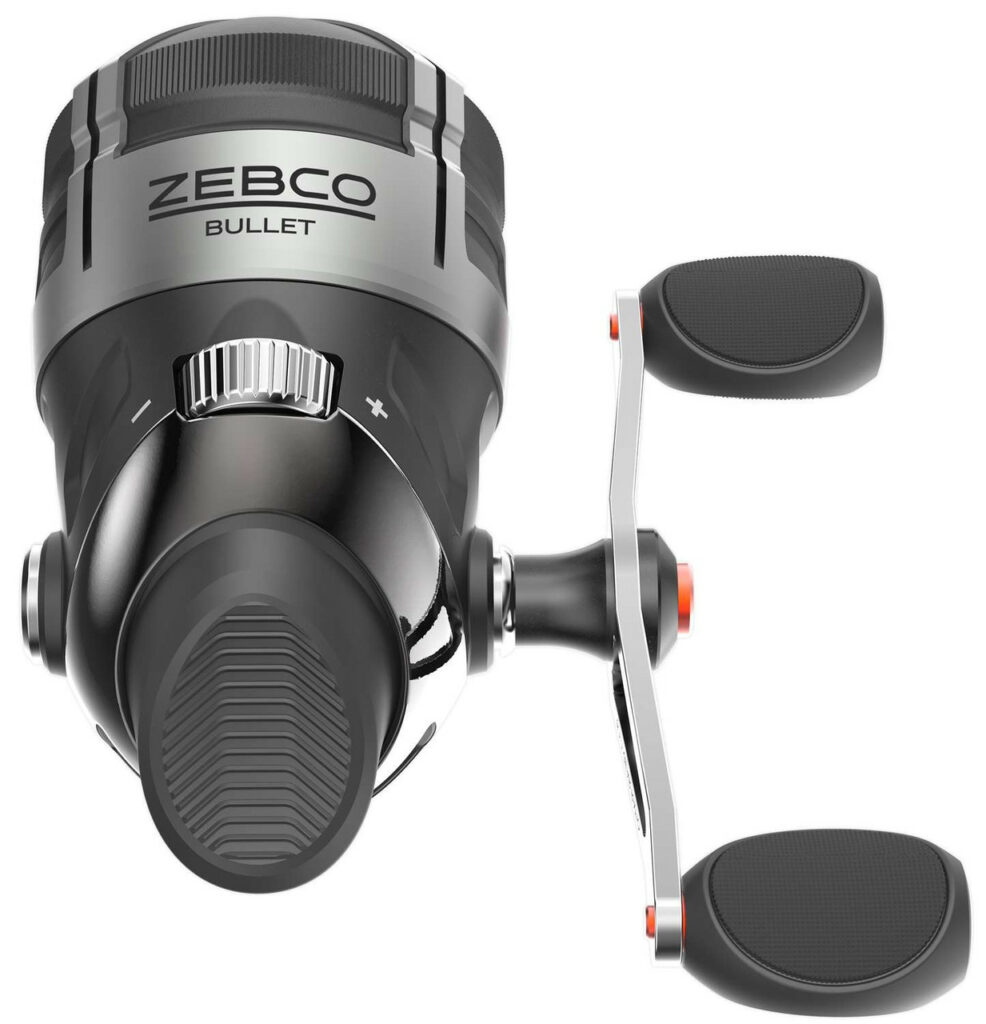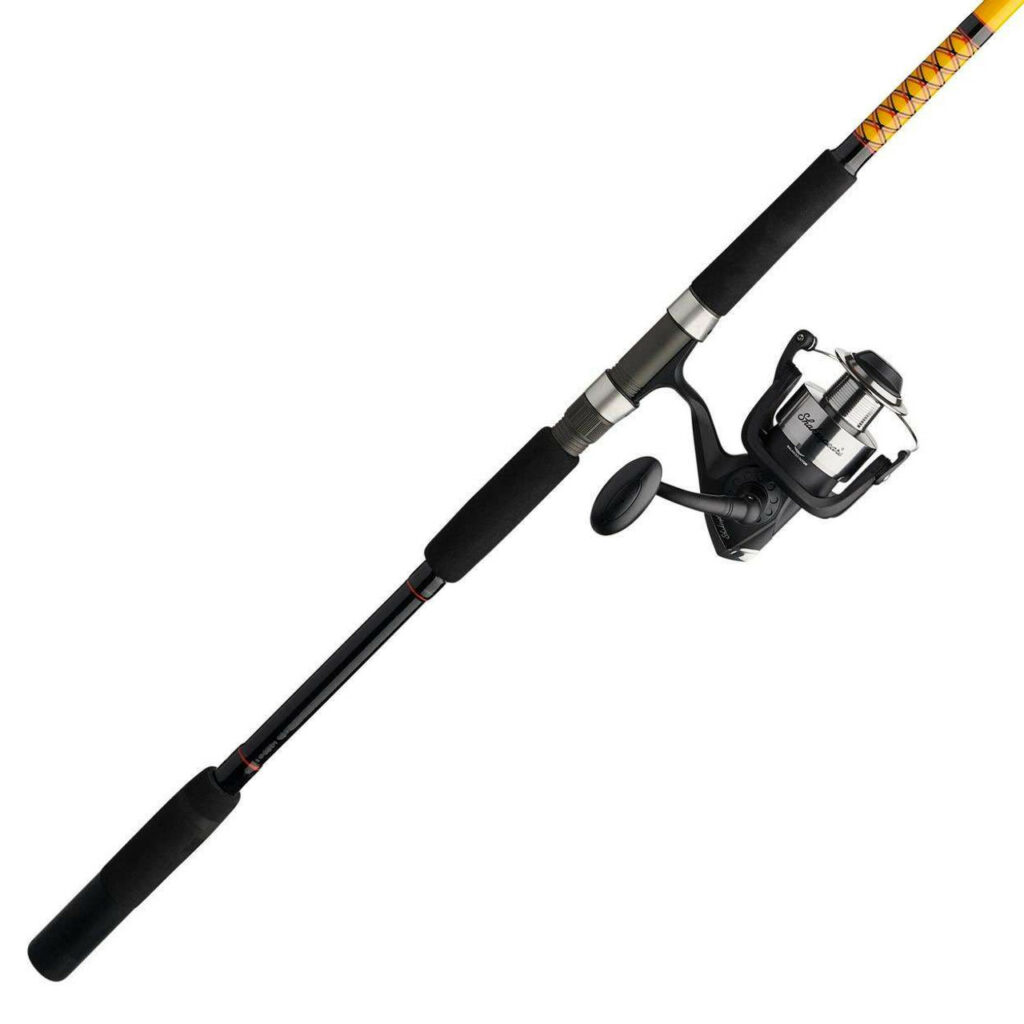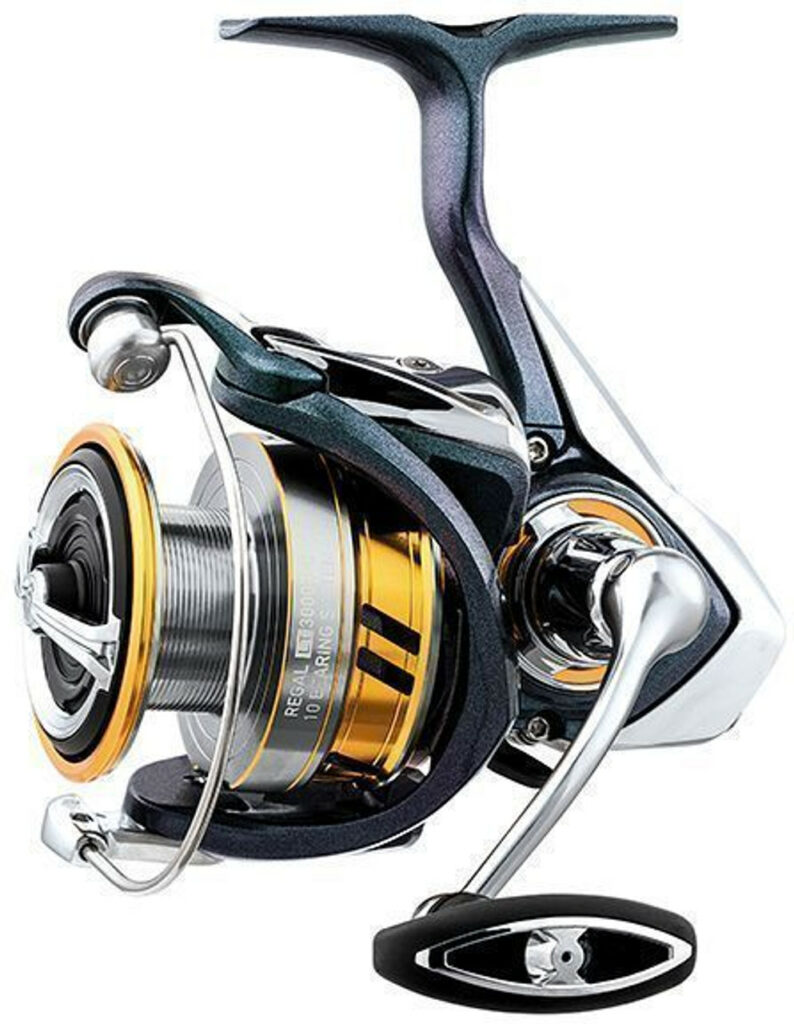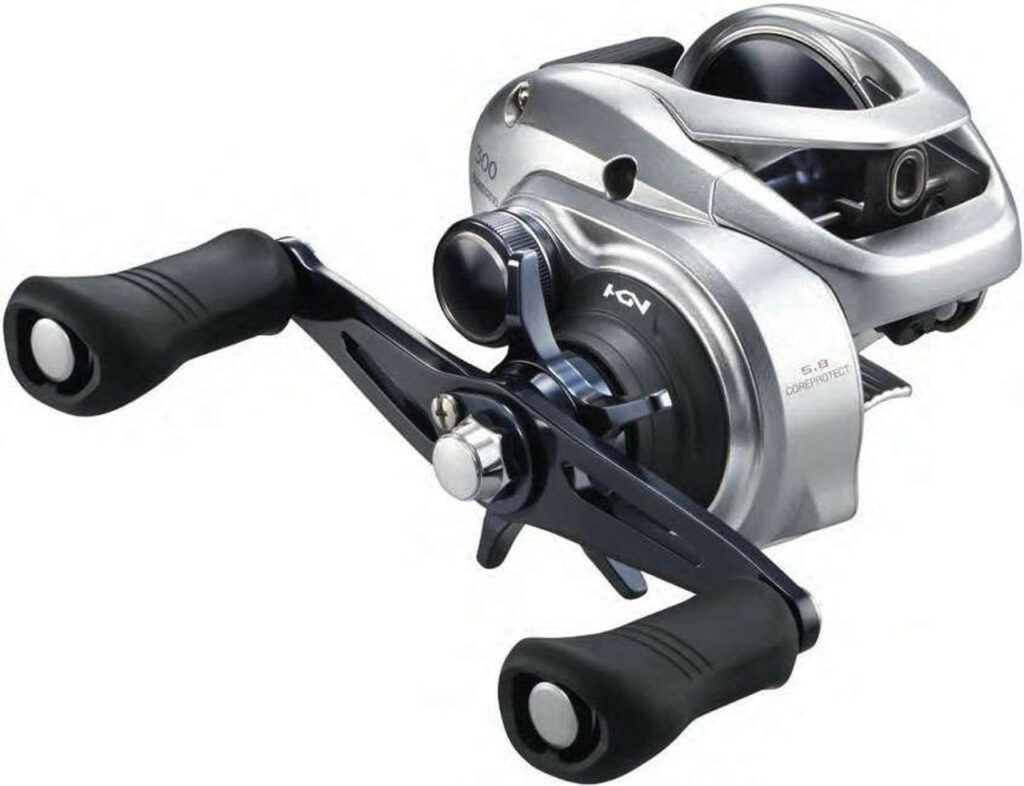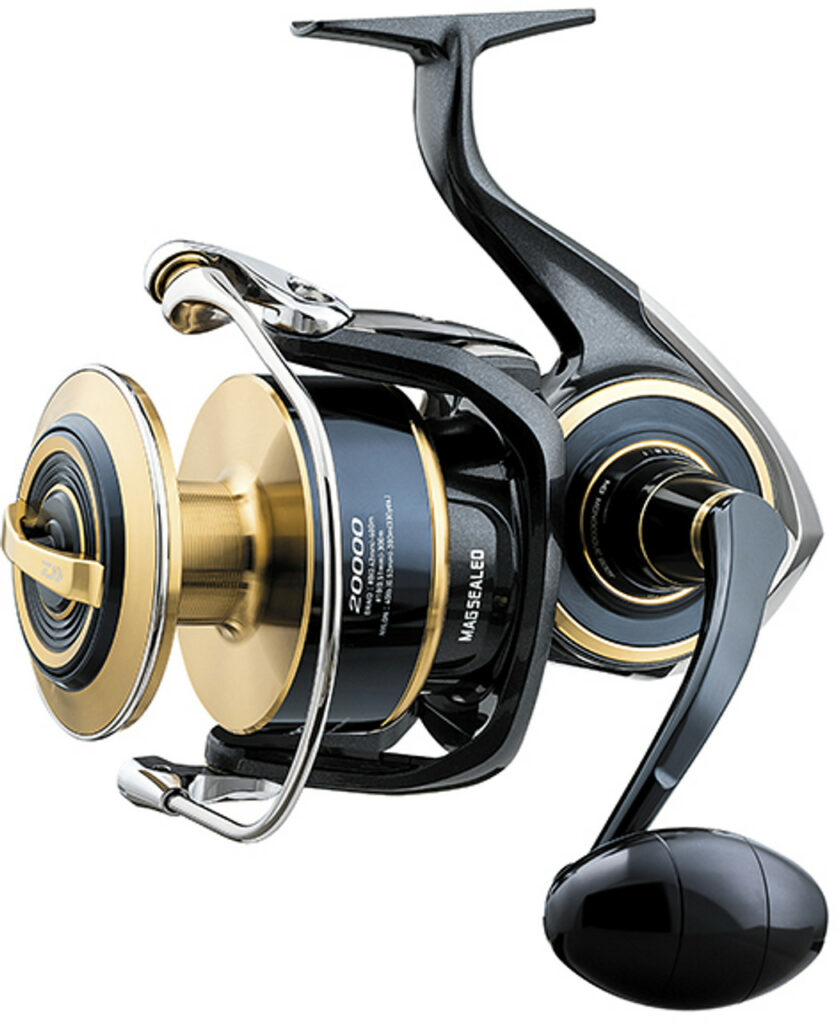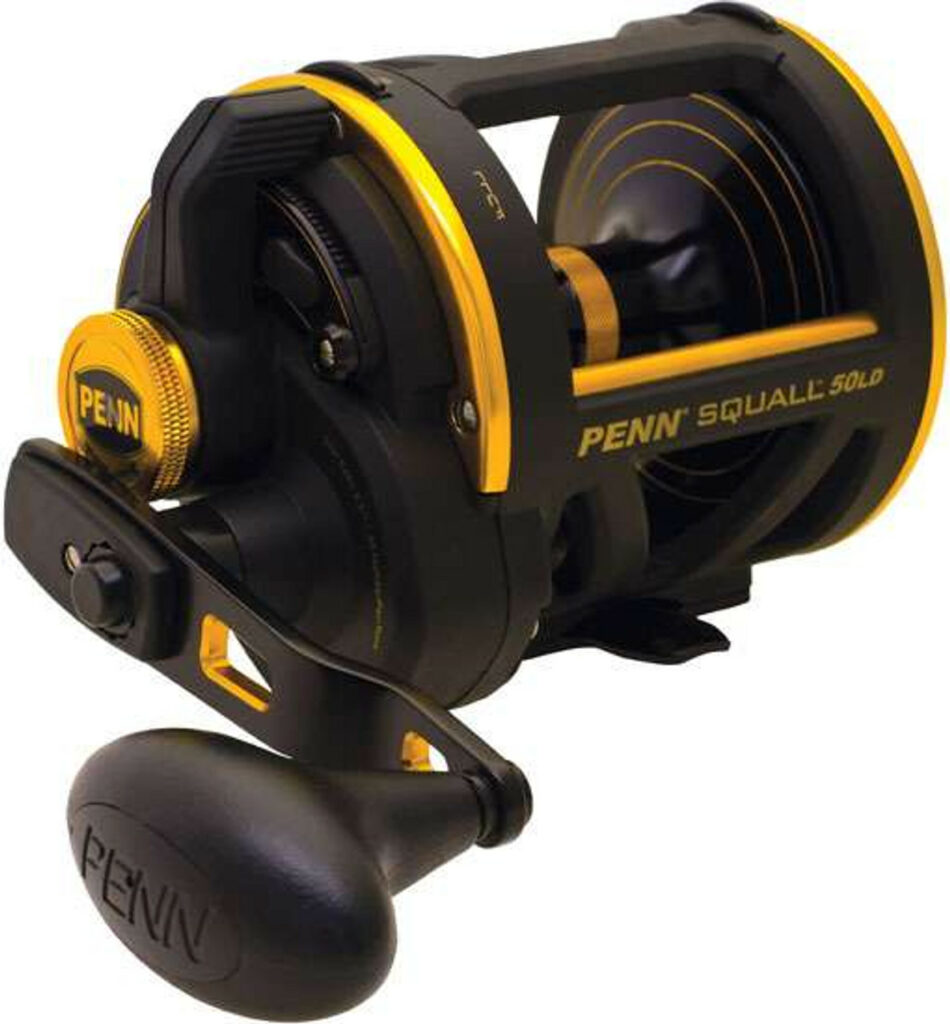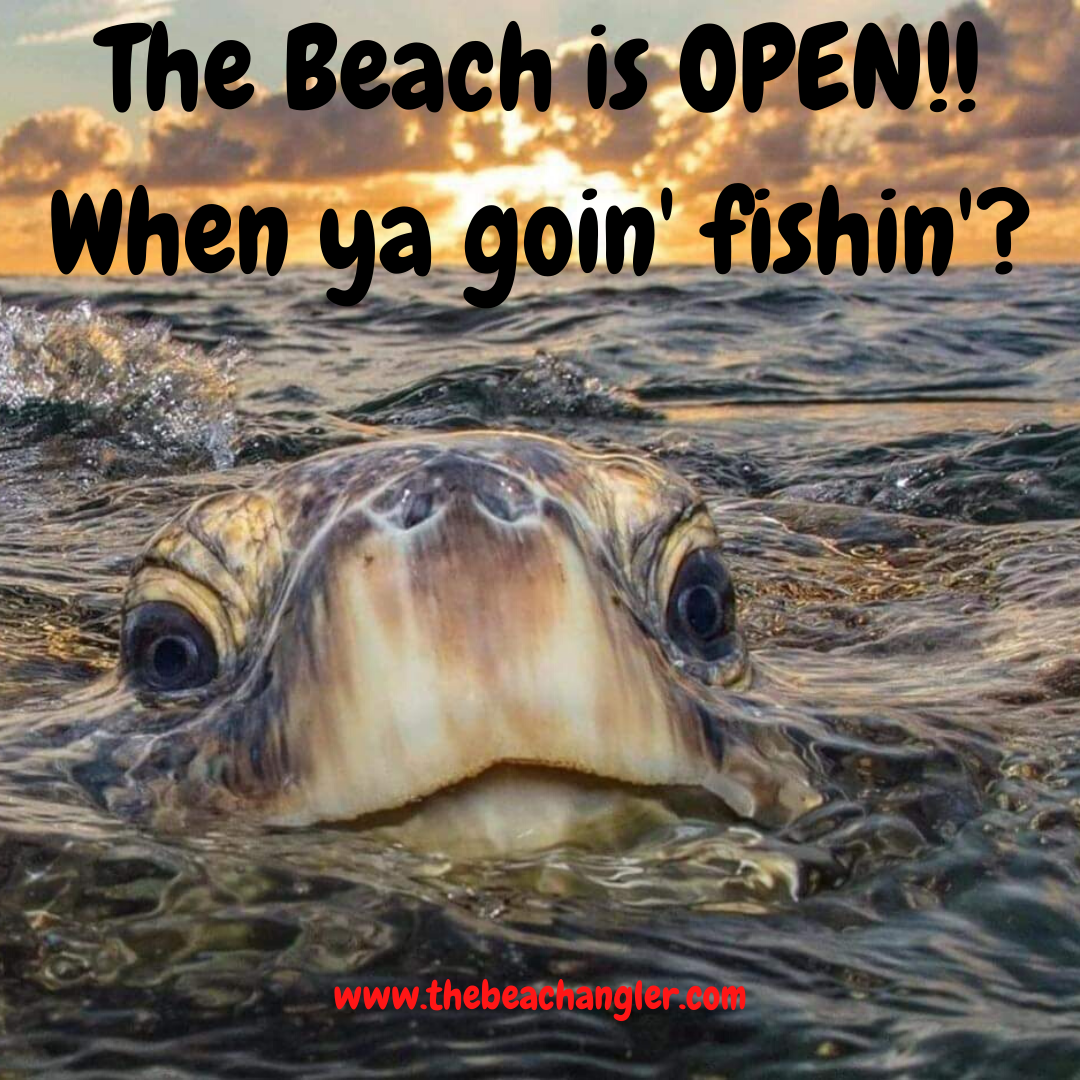Last updated on June 8th, 2024 at 01:06 pm
Saltwater fishing is an exciting and challenging sport that requires the right equipment. In fact, its success relies heavily on the selection of the right fishing gear. One of the most important pieces of equipment for saltwater fishing is the fishing reel. In this article, we’ll discuss everything you need to know about saltwater fishing reels, including the different types of reels available.
QUICK LOOK: 6 Tips for Choosing a Saltwater Fishing Reel
- Match Your Fishing Style: – If you’re an experienced angler looking for more control and accuracy, a baitcasting reel might be a better choice.
- Consider Your Target Fish: – If you’re targeting smaller fish like trout or redfish, a spinning reel will work just fine. If you’re targeting larger fish like tuna or marlin, you’ll need a more powerful reel like a conventional reel.
- Look at the Gear Ratio: – If you’re casting and retrieving artificials, you’ll want a higher gear ration. If you’re trolling for marlin offshore, a more powerful lower gear ratio is the way to go.
- Type of Drag System: – A good drag system will help you catch bigger fish more easily by allowing you to put pressure on the fish during the fight without breaking your line.
- How Much Line Capacity: – A larger line capacity means you can catch bigger fish, cast farther, and or fish in deeper waters. Larger line capacity will also allow you to use the heavier lines when fishing for big fish.
- Your Budget: – If you are a beginner, or a seasoned angler, there are great saltwater reels that will fit your budget and your fishing style and situations.
We’ll take a look at how to choose the right reel for your needs, and include some of the best saltwater fishing reels on the market. As an added bonus, we’ll even provide some insights into reel maintenance, line selection, and matching your reel with the proper rod.
Now, if you’re an avid saltwater angler, you already know that choosing the right fishing reel is crucial to your success on the water. But, with so many different types of reels available, it can be tough to know which one is right for you. Let’s take a look at some of the important factors you should consider when choosing a saltwater fishing reel and some tips to help you make the right choice. But first, what is the difference between freshwater and saltwater reels?
| Spinning Reels | Baitcasting Reels | Conventional Reels |
|---|---|---|
 |  |  |
| Okuma Inspira ISX | Shimano Calcutta | Penn International |
| Good Inshore Reel | Great for Artificials | Offshore Trolling |
| CHECK REVIEWS | CHECK REVIEWS | CHECK REVIEWS |
Saltwater vs Freshwater Fishing Reels
Saltwater and freshwater fishing reels have some differences. Saltwater reels are more specialized and designed to be more corrosion-resistant and have heavier-duty components that can handle the tougher conditions and larger fish of saltwater fishing. Freshwater reels are more general-purpose, less bulky, and typically less robust and not of high enough line capacity to contend with large saltwater fish like marlin or tuna.
Saltwater reels are made from stainless steel and other non-corroding components, while most freshwater reels will get damaged and corrode when in contact with saltwater.
In general, saltwater reels are made to catch bigger fish, which is why they have bigger line capacity than freshwater ones.
For offshore fishing, a heavy-duty, high-capacity, specialized baitcasting or spinning reel is ideal. Inshore or surf fishing situations will require a lighter spinning or baitcasting reel to be most effective. Important Note: while you can use freshwater reels in saltwater, It is not recommended. You risk serious damage to your reels, but in the end, the choice is yours of course.
Types of Saltwater Fishing Reels
There are several types of saltwater fishing reels available, each with its own advantages and disadvantages, so it’s important to choose the right one for your needs. When it comes to saltwater fishing reels, there is no shortage of choices but, there are three main types that dominate the market: spinning reels, baitcasting reels, and conventional reels.
Each caters to specific preferences and fishing styles, making it essential for anglers to understand the different nuances of each when choosing a reel. Spinning reels and baitcasting reels are two of the most popular types of fishing reels among anglers, particularly inshore and artificial lure anglers. They differ in how they are mounted on the rod, how the line is wound, and how they are used.
Spinning Reels
Spinning reels are the most popular type of saltwater fishing reel. They’re easy to use and versatile, making them a great choice for beginners and experienced anglers alike. Spinning reels are also lightweight and compact, which makes them easy to transport.
Spinning reels are mounted below the rod and have a spool that spins perpendicular to the rod. They are easier to use and more versatile than baitcating or conventional reels, but they work better with lighter lures.
Baitcasting Reels
Baitcasting reels, on the other hand, are mounted above the rod and have a spool that spins in line with the rod. They require more skill and practice to avoid backlash and tangles, but they offer more accuracy and distance with heavier lures. Baitcasting reels are also more powerful than spinning reels, which makes them a good choice for catching larger fish.
Baitcasting reels are designed for more experienced anglers. They’re more difficult to use than spinning reels so they may not be the best choice for beginners, but they offer greater accuracy, and control when casting. For these reasons, they are popular among professional freshwater and saltwater fishing anglers.
Conventional Reels
Saltwater conventional reels are the most powerful type of saltwater fishing reel. They’re designed for catching big fish in deep water. Saltwater conventional reels are also the most expensive type of reel, so they’re not a good choice for beginners. Conventional and baitcasting reels are both types of “revolving spool” reels, but they have some differences.
Saltwater conventional reels are generally larger with greater line capacity and more power, making them suitable for saltwater fishing or targeting large species like tuna. On the other hand, baitcasting reels are compact, lightweight, and more suited to inshore fishing, such as lure fishing for trout, red drum and flounder. Saltwater conventional reels are designed for fishing vertically from a boat, trolling, or situations where you let out line without casting.
Factors to Consider When Choosing a Saltwater Fishing Reel
When choosing a saltwater fishing reel, it’s important to consider your fishing style and target species. Different types of reels work better for different fish and fishing situations, so it’s important to choose the right one for your specific needs.
The success, or failure, of a fishing expedition can hinge on your reel’s performance, with key features such as drag system, gear ratio, and ball bearings all playing important roles. And, in the case of saltwater fishing reels, corrosion resistance becomes extremely important. In the following section, we will break down each element, helping to guide you on what to prioritize in your quest for the perfect saltwater fishing reel.
Fishing Style
Your fishing style will play a big role in determining which type of saltwater fishing reel is right for you. If you’re just starting out, a spinning reel is probably your best bet. If you’re an experienced angler looking for more control and accuracy, a baitcasting reel might be a better choice. Will you be surf fishing, casting artificials in the bay, or trolling for big bluefin tuna.
Target Species
Different types of fish require different types of reels. If you’re targeting smaller fish like trout or redfish, a spinning reel will work just fine. If you’re targeting larger fish like tuna or marlin, you’ll need a more powerful reel like a conventional reel. However, if you’ll be casting around structure, and need more control and accuracy, maybe a baitcasting reel would be your best choice.
Gear Ratio
The gear ratio of a fishing reel is an important factor to consider when choosing a saltwater fishing reel. The gear ratio determines how quickly you can retrieve your line. A higher gear ratio means you can retrieve your line more quickly. If you’re casting and retrieving artificials, you’ll want a higher gear ration. If you’re trolling for marlin offshore, a more powerful lower gear ratio is the way to go.
Drag System
The drag system of a fishing reel is another important factor to consider when choosing a saltwater fishing reel. The drag system determines how much resistance there is when you’re fighting a fish. A good drag system will help you catch bigger fish more easily by allowing you to put pressure on the fish during the fight without breaking your line. Bigger fish need a stronger drag, smaller fish a lighter drag and line.
Line Capacity
The line capacity of a fishing reel is another important factor to consider when choosing a saltwater fishing reel. The line capacity determines how much line you can put on your reel. A larger line capacity means you can catch bigger fish, cast farther, and or fish in deeper waters. Larger line capacity will also allow you to use the heavier lines you will need when fishing for big fish.
Your Budget
There are saltwater fishing reels in a wide range of prices. The good news is you don’t have to bust your budget to find a very good reel. If you are a beginner, or a seasoned angler, there are great saltwater reels that will fit your budget and your fishing style and situations.
Saltwater Fishing Reels for Beginners
Navigating the sea of options can be daunting, but certain brands consistently stand out. Shimano, Penn, Daiwa, and Abu Garcia have earned their stripes in the world of saltwater fishing reels. Let’s explore their strengths and specialties, and help you make an informed decision.
Now, when it comes to choosing the best saltwater fishing reel for beginners, there are several factors to consider. Some of the most important factors include ease of use, durability, and affordability. Based on these factors, here are some of the best saltwater fishing reels for beginners:
- Zebco 30A Bullet Spincast Fishing Reel: This reel is easy to use and has a smooth dial-adjustable drag system. It’s also durable and has powerful all-metal gears and stainless steel reel cover.
- Shakespear Ugly Stik Spinning Rod And Reel Combo: This combo is portable and versatile, making it a great choice for beginners. It’s also affordable and comes with everything you need to get started.
- Daiwa Regal LT Spin Reel-RGLT1000D: This reel is lightweight and easy to use, making it a great choice for beginners. It’s also durable and has a smooth drag system.
These reels are designed to handle saltwater conditions, offer smooth and powerful performance, and resist corrosion and wear. They’re also affordable, making them a great choice for beginners.
Some of the Best Saltwater Fishing Reels
There are many great saltwater fishing reels on the market today. And, as we’ve previously discussed, there are important factors to consider that are specific to you and your fishing situation. With that in mind, these are some of the best saltwater fishing reels:
- Penn Spinfisher VI Spinning Reel: This spinning reel is designed for saltwater use and features a waterproof drag system and sealed stainless steel bearings.
- Shimano Tranx Baitcasting Reel: This baitcasting reel is designed for heavy-duty use and features an extra-large handle and powerful drag system.
- Daiwa Saltiga Saltwater Spinning Reel: This spinning reel is designed for big game fish and features a waterproof drag system and corrosion-resistant construction.
- Shimano Stella SW Spinning Reel: This spinning reel is designed for extreme conditions and features a waterproof drag system and corrosion-resistant construction.
- Penn Squall Lever Drag Conventional Reel: This conventional reel is designed for big game fish and features a powerful drag system and corrosion-resistant construction.
How to Maintain Your Saltwater Fishing Reel
Once you decide on a new reel, it will be extremely important that you maintain your reel to ensure it performs as it should and gives you many years of service for your hard-earned dollar.
1. Rinse your reel with fresh water after each use to remove any salt buildup and prevent corrosion.
2. Check the drag system on your reels regularly to ensure it is functioning properly.
3. Use a protective reel cover or case to protect your reels during transportation.
4. Avoid using abrasive cleaners or solvents on your reels, as they can damage the finish or strip the lubrication.
5. Loosen the drag after your fishing activity to alleviate the pressure off the drag washers.
6. Do not disassemble your reel.
7. Clean the reel exterior with a spray bottle.
8. Respool regularly with fresh line.
9. Tighten the screws periodically.
10. Keep your reels stored away from direct sunlight.
Choosing a Line for Your New Saltwater Reel
The right line weight for your saltwater fishing reel is an important factor to consider. Obviously, you reel won’t do you much good without fishing line. Here are some tips to help you choose the right line and line weight for your new reel:
- Check the manufacturer’s recommendations: Most manufacturers provide a chart that recommends the best line weights for their products. This is a good place to start when choosing the right line weight.
- Consult with a fishing expert: A fishing expert can help you choose the right line weight based on your fishing style, target species, and other factors.
- Experiment: Try different line weights until you find one that works well for you. This may take some trial and error, but it’s worth it to find the right line weight.
- Evaluate your fishing environment: Consider the water conditions, targeted fish species, and tackle type when choosing your line weight.
- Consider the size of fish you’re targeting: If you’re targeting smaller fish, you won’t need as heavy of a line. On the other hand, if you’re targeting larger fish, you’ll need a line that can handle the weight.
How to Choose a Rod for Your New Saltwater Reel
Now that you have a new saltwater reel, choosing the right rod will be crucial to your success on the water. There are rod and reel combos where the manufacturer has already paired the reel with a rod that matches the specifications and applications of the reel. This can be a good option, particularly for beginners, as it makes for one less decision when starting out. Here are some factors to consider when choosing a saltwater fishing rod:
Rod Length
The length of a saltwater fishing rod is an important factor to consider. Longer rods cast farther, while shorter rods provide more power for fighting fish. Consider where you’ll be fishing and what type of fish you’ll be targeting when choosing the length of your rod.
Power
The power of a saltwater fishing rod refers to its lifting strength. Rods are rated from light to extra heavy, with heavier rods being able to lift more weight, and fight bigger fish. Consider the size of the fish you’ll be targeting when choosing the power of your rod.
Rod Action
The action of a saltwater fishing rod refers to how much it bends when pressure is applied. Rods are rated from fast to slow, with slower rods being stiffer and faster rods bending all the way to the handle. Consider what type of lures you’ll be using and what type of fish you’ll be targeting when choosing the action of your rod. Faster rods are better for casting smaller baits and lures. Slower rods are best for trolling and deep dropping baits for big offshore fish.
Rod Material
Saltwater fishing rods are typically made from graphite or fiberglass. Graphite rods are stiffer and more sensitive, while fiberglass rods are tougher and more powerful. Consider what type of fishing you’ll be doing and what type of fish you’ll be targeting when choosing the material of your rod. Graphite is great for fishing artificials or anywhere you need extra sensitivity to feel those subtle bites. Fiberglass is built to handle the fight and abuse from the biggest fish.
Reel Type
Different types of saltwater fishing reels require different types of rods. Spinning reels work best with spinning rods, while baitcasting reels work best with baitcasting rods. Consider what type of reel you’ll be using when choosing your saltwater fishing rod. The easiest way to tell them apart is by looking at the eyes of the rod. The first couple of eyes closest to the reel seat, on spinning rods, will be larger in diameter than on a casting rod.
Here’s a summary of the factors to consider when choosing a saltwater fishing rod:
| Rod Feature | Description |
|---|---|
| Length | Longer rods cast farther, while shorter rods provide more power. |
| Power | Heavier rods can lift more weight. |
| Action | Faster rods are stiffer, while slower rods bend all the way to the handle. |
| Material | Graphite rods are stiffer and more sensitive, while fiberglass rods are tougher and more powerful. |
| Reel Type | Different types of reels require different types of rods. |
Saltwater Fishing Reels Frequently Asked Questions

How often should I clean my saltwater fishing reel?
Regular cleaning after each use is recommended, with a more thorough maintenance session at least once a month.
Can I use a freshwater reel for saltwater fishing?
It’s not advisable. Saltwater reels are designed to withstand the corrosive nature of salt, ensuring longevity and optimal performance.
What is the ideal gear ratio for saltwater fishing?
The ideal gear ratio depends on the fishing style. For versatility, a medium gear ratio between 6:1 and 7:1 is often preferred.
How do I choose the right reel size for a specific species?
Consult the reel size chart provided by the manufacturer, taking into account the targeted species and fishing conditions.
Are expensive reels worth the investment?
High-quality reels often come with advanced features and better materials that contribute to durability and performance. While they may be pricier, the investment is often justified for serious anglers who prioritize longevity and functionality.
Saltwater Fishing Reels: Find The Best for You
The right saltwater fishing reel is an important decision. It can be crucial to your success on the water. By considering these factors when choosing a saltwater reel, you’ll be able to make an informed decision that will help you catch more fish.
In the world of saltwater fishing reels, the adage “you get what you pay for” holds true to a point. While the most expensive reel may or may not be the “best”, the cheapest almost never is.
Fortunately, there are so many options available, from many reputable companies, that you can find an excellent saltwater fishing reel for any fishing style, target species, and budget.
In fact, depending on the fishing type, there are saltwater reels from $40 to well over $1000. So, whether you’re a novice angler or a seasoned pro, may your reels be ever smooth, your lines be tight, and your adventures at sea be nothing short of extraordinary. Tight lines and happy fishing!
As always, stay safe, enjoy the journey and please try to leave it cleaner than you found it. If you have any comments, questions, ideas or suggestions please leave them in the comment section below and I’ll get back to you asap.
You can follow us on Facebook: Rex The Beach Angler, Instagram: thebeachangler7, Twitter: @AnglerBeach, and YouTube: Man Art Creations.

P.S. – Thanks so much for checking out our blog we really appreciate it. Just so you know, we may receive a commission if you click on some of the links that appear on our site. This helps us keep our content free and up-to-date for everyone. We appreciate your support!

A life long surf fisherman with 50+ years of experience, I am also an avid hunter and outdoorsman. I will be sharing my passion for the outdoors with you so be prepared for hunting, fishing, camping, hiking and more. Along with gear reviews and the latest trends and innovations in the outdoor industry.
